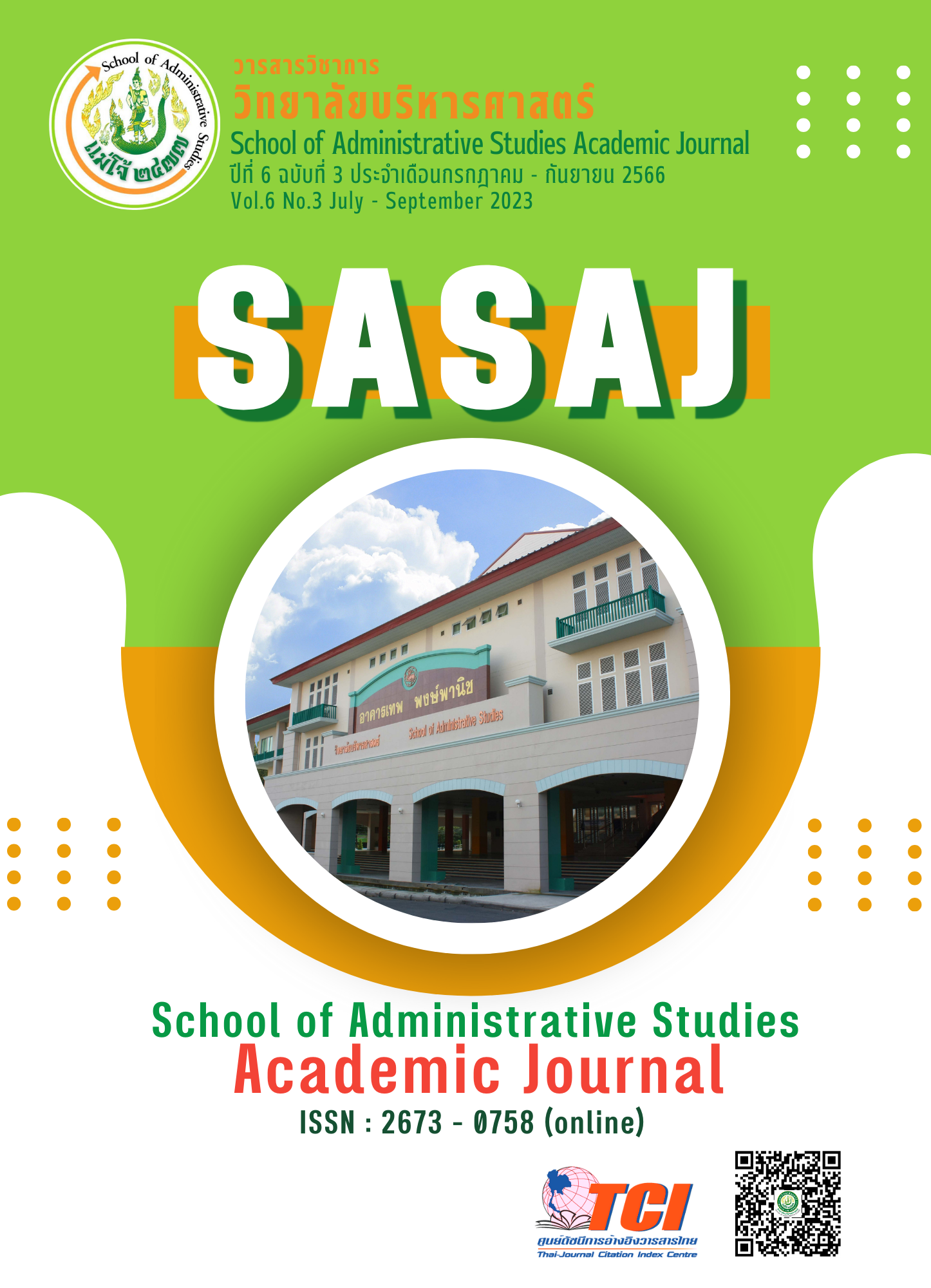การบูรณาการจิตวิญญาณแห่งถิ่นที่สู่เป้าหมายการพัฒนาที่ยั่งยืนด้วยการจัดการประโยชน์เชิงพื้นที่เพื่อการอนุรักษ์และการท่องเที่ยว กรณีศึกษา พื้นที่ป่าต้นจากของชุมชนไทรทอง อำเภอไม้แก่น จังหวัดปัตตานี
Main Article Content
บทคัดย่อ
การวิจัยนี้มีวัตถุประสงค์เพื่อวิเคราะห์จิตวิญญาณแห่งถิ่นที่สำหรับบูรณาการสู่การจัดการปัจจัยสภาพแวดล้อมพื้นที่ลุ่มน้ำ จังหวัดชายแดนใต้ และเพื่อเสนอแนวทางบูรณาการจิตวิญญาณแห่งถิ่นที่สู่การจัดการปัจจัยสภาพแวดล้อมพื้นที่ลุ่มน้ำ จังหวัดชายแดนภาคใต้ ภายใต้บริบทการเปลี่ยนแปลงนิเวศวิทยาทางสังคม กรณีศึกษาชุมชนไทรทอง อำเภอไม้แก่น จังหวัดปัตตานี โดยใช้วิธีการศึกษาทางสังคมศาสตร์และมานุษยวิทยาด้วยกระบวนการวิจัยเชิงคุณภาพ (Qualitative Research) โดยรวบรวมข้อมูลหลัก (Main Data) จากการสัมภาษณ์แบบกึ่งมีโครงสร้าง (Semi-structured Interview) การอภิปรายกลุ่ม (Focus Group) รวมถึงการวิจัยเชิงเอกสาร (documentary research) ประเภทเอกสารชุดข้อมูลชุมชนไทรทอง (Documents Data) และใช้การสังเกตภาคสนาม (Field Observation) เพื่อนำมาสู่การวิเคราะห์เนื้อหา (Content Analysis)
ผลการศึกษาพบว่า จิตวิญญาณแห่งถิ่นที่ของชุมชนไทรทอง ประกอบด้วย 1) ความผูกพันระหว่างผู้คนกับพื้นที่ (People and Place) ซึ่งมีป่าต้นจากเป็นสิ่งสร้างจิตสำนึกร่วมของชุมชน และ 2) ป่าต้นจากกับจิตสำนึกต่อถิ่นที่ของชุมชนไทรทอง (Sense of Place) ถูกสร้างการรับรู้เชิงอัตลักษณ์ทั้งภายในและภายนอกชุมชน ซึ่งจิตวิญญาณแห่งถิ่นที่ของชุมชนไทรทองสามารถก่อรูปความเป็นทุนสำหรับการพัฒนาชุมชนได้ 4 ประการ คือ ทุนธรรมชาติ ทุนสังคม ทุนวัฒนธรรม และทุนเศรษฐกิจท้องถิ่น เมื่อนำทุนเหล่านี้มาวิเคราะห์ร่วมกับองค์ประกอบของเป้าหมายการพัฒนาที่ยั่งยืนใน 4 มิติ ประกอบด้วยมิติเศรษฐกิจ สังคม สิ่งแวดล้อม และหุ้นส่วนการพัฒนา สามารถนำมาใช้เป็นแนวทางบูรณาการจิตวิญญาณแห่งถิ่นที่สู่การจัดการปัจจัยสภาพแวดล้อมพื้นที่ลุ่มน้ำ ดังบทความนี้นำเสนอด้วยแบบจำลองการจัดการประโยชน์เชิงพื้นที่เพื่อการอนุรักษ์ของชุมชนไทรทอง และการจัดการประโยชน์เชิงพื้นที่ด้วยการบูรณาการการท่องเที่ยว
Article Details

อนุญาตภายใต้เงื่อนไข Creative Commons Attribution-NonCommercial-NoDerivatives 4.0 International License.
ลิขสิทธิ์
เอกสารอ้างอิง
กองอำนวยการรักษาความมั่นคงภายในราชอาณาจักร. (2547). กองอำนวยการรักษาความมั่นคงภายในภาค 4 ส่วนหน้า. สืบค้นจาก https://www.southpeace.go.th/?page_id=2.
สำนักงานจังหวัดปัตตานี กลุ่มงานยุทธศาสตร์และข้อมูลเพื่อการพัฒนาจังหวัด. (2562). แผนพัฒนาจังหวัดปัตตานี พ.ศ.2561-2565. สืบค้นจาก http://www.pattani.go.th/files/com_news_devpro/2020-07_818adeba8ea8764.pdf
สำนักนายกรัฐมนตรี สำนักงานสภาความมั่นคงแห่งชาติ. (2562). นโยบายและแผนระดับชาติว่าด้วยความมั่นคงแห่งชาติ (พ.ศ.2562-2565). สืบค้นจาก https://www.nsc.go.th
สุเมธ ตันติเวชกุล. (2562). การน้อมนำยุทธศาสตร์พระราชทานมาปรับใช้ในการแก้ไขปัญหาจังหวัดชายแดนภาคใต้. สืบค้นจาก https://www.sbpac.go.th/?p=30030
องค์การบริหารส่วนตำบลไทรทอง. (2564). ประวัติความเป็นมา. สืบค้นจาก https://www.thrithong.go.th/history.php
อดิศร ศรีเสาวนันท์, และ วีระ อินพันทัง. (2559). แนวความคิดเรื่องสถานที่และปรากฏการณ์วิทยากับการศึกษางานสถาปัตยกรรมพื้นถิ่น. วารสารวิชาการสิ่งแวดล้อมสรรค์สร้างวินิจฉัย, 15(1), 1-20.
อภิวัฒน์ สมาธิ, ภาณุ ธรรมสุวรรณ, กรกฎ ทองขะโชค, และ กฤษกร พลีธัญญวงศ์. (2561). การแก้ปัญหาความมั่นคงในสามจังหวัดชายแดนภาคใต้ กรณีศึกษาโครงการกำปงตักวาและโครงการพาคนกลับบ้าน. วารสารสถาบันวิชาการป้องกันประเทศ, 9(3), 45-59.
Amadeus, (2016). Future Traveller Tribes 2030 Understanding Tomorrow’s traveler. Retrieved from https://amadeus.com/documents/en/retail-travel-agencies/research-report/amadeus-future-traveller-tribes-2030-report.pdf
George, E., Mair, H. & Reid, D. (2009). Rural Tourism Development: Localism and Cultural Change. Bristol, Blue Ridge Summit: Channel View Publications. https://doi.org/10.21832/9781845411015
Jorgensen, B. & Stedman, R. (2001). Sense of Place as an Attitude: Lakeshore Owners Attitudes toward their Properties. Journal of Environmental Psychology, 21(3), 233-248.
Julia, S. (2016). Future Traveller Tribes 2030 Understanding Tomorrow’s traveler. Retrieved from https://amadeus.com/documents/en/retail-travel-agencies/research-report/amadeus-future-traveller-tribes-2030-report.pdf
Mcintyre, G. (1993). Sustainable tourism development: guide for local planners. Madrid: World Tourism Organization (WTO).
Saranphat, W. (2016). Tourism, Modernity and Spirit of Place: A Case Study of Religious Heritage Site Management In Lumphun, Thailand. In Proceeding of the 4th International Conference on Hospitality and Tourism Management. (pp. 55-63). Vienna, ICTMH.
United Nations (2015). Sustainable Development Goals. Retrieved from https://sdgs.un.org/goals
World Health Organization. (2012). Programme on mental health: WHOQOL user manual, 2012 revision. Retrieved from https://apps.who.int/iris/handle/10665/77932


